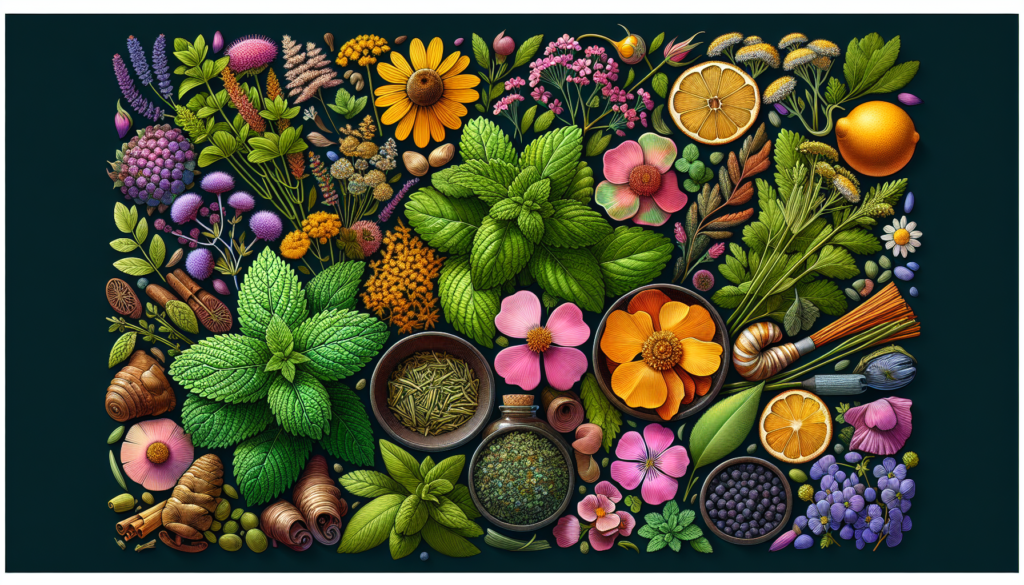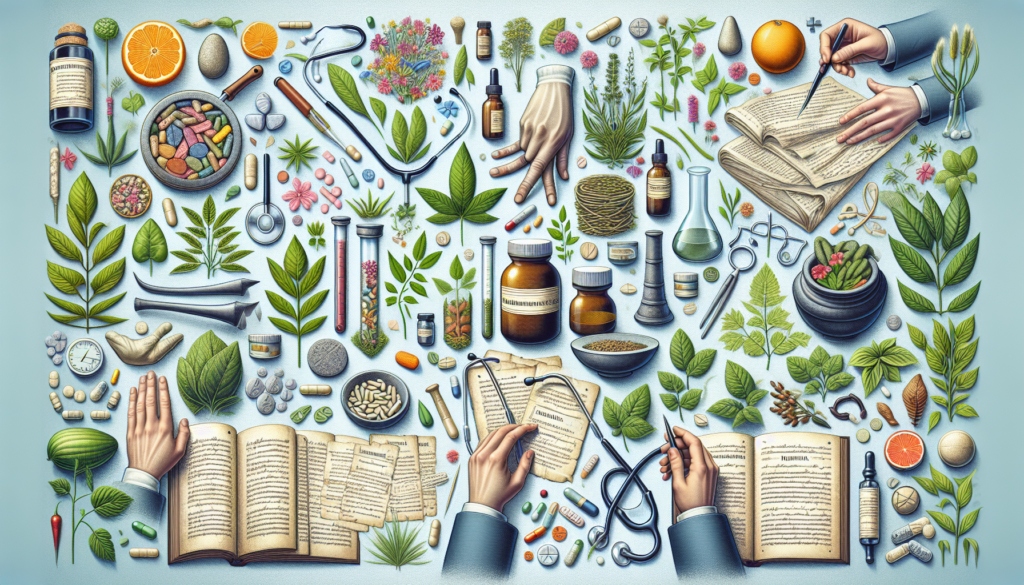So you’ve probably come across the terms “herbal remedies” and “alternative medicine” a bunch of times, but have you ever wondered what the medical community actually calls these ancient healing practices? We’ve all heard stories about how certain plants and herbs can cure ailments, but what’s the official name for these natural remedies in the medical world? In this article, we’re going to uncover the not-so-secret medical term for herbal remedies and shed some light on their role in modern healthcare. Get ready to expand your knowledge and discover the fascinating world of botanical medicine!

Defining Herbal Remedies
Understanding the Concept
When it comes to healthcare and treatment options, herbal remedies have been used for centuries. But what exactly are herbal remedies? In simple terms, they are natural remedies that utilize plants and plant-derived substances to promote healing and enhance overall well-being. These remedies can come in various forms, such as teas, tinctures, capsules, or ointments, and are often chosen for their medicinal properties. It’s important to note that herbal remedies should be seen as complementary to, rather than a replacement for, traditional medicine.
Distinguishing from Traditional Medicine
To understand herbal remedies better, it’s essential to distinguish them from traditional medicine. Traditional medicine refers to the conventional medical practices and treatments that have been developed and practiced over time. These practices often involve the use of synthetic medications, surgeries, and other interventions that are based on scientific research and evidence. On the other hand, herbal remedies draw on the vast knowledge of plant properties and their historical use in promoting health and healing. They are often considered as a more holistic approach to healthcare, focusing on natural substances that work in harmony with the body.
Exploring the Medicinal Properties
One of the key aspects of herbal remedies is their medicinal properties. Plants are a treasure trove of compounds that have been found to possess therapeutic effects. For example, some plants have anti-inflammatory properties, while others have antibacterial or antiviral effects. Certain plants are known for their ability to support digestion or boost the immune system. These medicinal properties are harnessed through various parts of the plant, including leaves, flowers, roots, and barks. By understanding the properties of different plants, herbalists can create specific remedies to address various health concerns.
Herbal Medicine and its Various Names
Medical Terminology of Herbal Remedies
When discussing herbal remedies within the medical field, several terms are commonly used. One of these terms is phytotherapy, which comes from the Greek words “phyto” meaning plants, and “therapeia” meaning therapy. Phytotherapy is a broad term that encompasses the use of plants and plant-derived substances for medicinal purposes. It emphasizes the importance of the whole plant rather than isolating specific compounds.
Alternative Terminology
While phytotherapy is a widely accepted term, herbal remedies may also be referred to by other names. Herbalism is another commonly used term, which describes the practice of using plants for medicinal purposes. This term focuses more on the practitioners themselves, known as herbalists, who are knowledgeable in the properties of plants and their applications. Another term used is botanical medicine, which emphasizes the use of plants and plant-based products for therapeutic use.
Historical References
The use of herbal remedies dates back to ancient times, with various cultures and civilizations recognizing the healing properties of plants. In ancient Egypt, for example, papyrus texts contained detailed information about the use of different herbs for medicinal purposes. Similarly, ancient Chinese medicine incorporated herbs as one of its primary treatment modalities. Throughout history, herbal remedies have been documented in numerous texts, manuscripts, and records, showcasing their long-standing significance in healthcare.
Key Principles of Herbal Remedies
Holistic Approach to Healing
One of the key principles of herbal remedies is the adoption of a holistic approach to healing. Unlike traditional medicine that often focuses on treating symptoms or specific diseases, herbal medicine takes into account the overall well-being and balance of the individual. Herbalists believe that true healing involves addressing the root cause of the ailment and promoting harmony in the body, mind, and spirit.
Individualized Treatment
Herbal remedies also embrace the concept of individualized treatment. Each person is seen as unique, and their health concerns are assessed on a case-by-case basis. Herbalists take into consideration factors such as the person’s constitution, lifestyle, and specific symptoms when creating a treatment plan. This individualized approach allows for tailored remedies that cater to the specific needs of each individual.
Emphasis on Prevention
In addition to treating existing health conditions, herbal medicine emphasizes the importance of prevention. By promoting overall health and well-being, herbalists aim to prevent the development of diseases and maintain a state of balance in the body. This proactive approach involves incorporating herbal remedies into daily routines to support the body’s natural healing mechanisms and keep it in optimal condition.
Utilizing Plant-Based Medicines
As the name suggests, herbal remedies rely heavily on plant-based medicines. Plants contain a wide array of compounds that can have significant effects on the body. Herbalists select specific plants or combinations of plants to create remedies tailored to a person’s needs. These remedies can be in various forms, such as teas, tinctures, ointments, or capsules, allowing for flexibility and ease of use.
The Medical Term for Herbal Remedies
Phytotherapy
As mentioned earlier, the term phytotherapy is often used in the medical field to describe the practice of using plants for medicinal purposes. It encompasses the whole plant and the synergistic effects of its various compounds. Phytotherapy emphasizes the importance of the relationship between humans and plants, recognizing the potent healing potential that nature provides.
Herbalism
Herbalism is another term closely associated with herbal remedies. It refers to the traditional practice of utilizing plants for therapeutic purposes. Herbalists, who are knowledgeable in the properties and uses of plants, play a crucial role in herbalism. They draw on their expertise to create tailored remedies for individuals, considering both their specific health concerns and overall well-being.
Botanical Medicine
Botanical medicine is a term used to describe the use of plants and plant-based products for medicinal purposes. It highlights the use of natural substances derived from plants rather than synthetic compounds. Botanical medicine recognizes the wealth of therapeutic potential that can be found in nature, utilizing plants in their whole or processed form to support health and well-being.

Exploring Phytotherapy
What is Phytotherapy?
Phytotherapy is a branch of herbal medicine that focuses on the therapeutic use of plants and plant-derived substances. It involves the systematic study of plants’ medicinal properties and their effects on the human body. Phytotherapists utilize their extensive knowledge of plants to create remedies that address specific health concerns and promote overall well-being.
Medical Applications and Uses
Phytotherapy has a wide range of medical applications and uses. It can be employed to address acute conditions such as colds, fevers, or headaches, as well as chronic conditions like arthritis or digestive disorders. It may also be utilized to support various bodily systems, such as the immune, respiratory, cardiovascular, or nervous system. Phytotherapists carefully select plants based on their known therapeutic properties to create remedies that are tailored to an individual’s specific needs.
Safety and Efficacy
One of the important considerations of phytotherapy is the safety and efficacy of herbal remedies. While herbal remedies are generally considered safe, it is crucial to ensure that they are used appropriately and under the guidance of a qualified practitioner. Phytotherapists undergo extensive training to understand the potential interactions and contraindications of different plants, ensuring that the remedies prescribed are both safe and effective for the individual.
Training and Regulation
Phytotherapy requires specialized training to ensure that practitioners have a deep understanding of plants, their properties, and their effects on the body. Training programs often include topics such as plant identification, herbal medicine preparation, therapeutic applications, and safety considerations. In many countries, there are regulatory bodies that govern the practice of phytotherapy to ensure that practitioners adhere to professional standards and provide safe and effective care.
Understanding Herbalism
Definition and Scope
Herbalism is the practice of using plants and plant-based remedies for therapeutic purposes. It encompasses a broad scope, including the identification and collection of plants, the preparation and formulation of remedies, and the application of these remedies to support health and healing. Herbalism recognizes the interconnectedness of nature and humans, drawing upon the wisdom of plants to promote holistic well-being.
History and Cultural Significance
Herbalism has a rich history that spans cultures and civilizations. Indigenous cultures around the world have long relied on plants for their medicinal properties, passing down knowledge through generations. Ancient systems of medicine, such as Traditional Chinese Medicine and Ayurveda, incorporate herbalism as a central pillar of their practices. The cultural significance of herbalism is evident in the traditions, rituals, and ceremonies associated with plant-based healing.
Herbalists and their Practices
Herbalists are practitioners who have dedicated their lives to the study and practice of herbalism. They possess a deep understanding of plants, their medicinal properties, and how to best utilize them to promote healing. Herbalists may work with individuals on a one-on-one basis, creating customized treatment plans, or they may operate within larger healthcare settings. They often take into consideration a person’s overall health and well-being to determine the most appropriate herbal remedies.
Integration with Modern Medicine
Herbalism has found its place within modern medicine as an integrative approach to healthcare. Many healthcare professionals recognize the value of herbal remedies and incorporate them into their treatment plans. Integrative clinics and hospitals may have herbalists as part of their healthcare team, working alongside doctors and other practitioners to provide comprehensive care. This integration allows the benefits of herbal remedies to be combined with the advancements of modern medicine.

Exploring Botanical Medicine
Defining Botanical Medicine
Botanical medicine refers to the use of plants and plant-based products for medicinal purposes. It recognizes the therapeutic potential of natural substances derived from plants and aims to utilize them to support health and healing. Botanical medicine can encompass a wide range of remedies, such as teas, tinctures, extracts, creams, or capsules, which can be tailored to individual needs.
Botanical Remedies in Modern Healthcare
The use of botanical remedies in modern healthcare is becoming increasingly prevalent. Many over-the-counter products, such as herbal teas or supplements, contain botanical ingredients. These products are often marketed for their specific health benefits and are used as complementary therapies alongside traditional medical treatments. Botanical remedies are also utilized by healthcare professionals in various settings, from hospitals and clinics to wellness centers and integrative practices.
Research and Evidence-Based Practices
As the field of botanical medicine continues to grow, so does the research and evidence supporting its practices. Scientific studies are conducted to explore the effects and mechanisms of action of various plants and plant compounds. This research helps to establish the safety and efficacy of botanical remedies when used for particular health conditions. Evidence-based practices in botanical medicine ensure that recommendations and treatments are supported by scientific findings.
Importance of Regulation and Quality Control
Regulation and quality control are vital aspects of botanical medicine. Due to the natural variability of plants and the potential for adulteration or contamination, it is crucial to ensure that botanical products are safe, pure, and of high quality. Regulatory bodies and organizations set standards for manufacturing, labeling, and safety testing of botanical remedies. Quality control measures also involve proper identification and sourcing of plants, ensuring that the correct species and plant parts are used.
Alternative Terminology for Herbal Remedies
Natural Remedies
The term “natural remedies” is often used interchangeably with herbal remedies. It refers to treatments or therapies that rely on natural substances, such as plants, minerals, or animal products, to promote health and healing. Natural remedies often emphasize the use of substances that are minimally processed or derived directly from nature.
Traditional Medicine
While traditional medicine encompasses a broader range of practices, it frequently includes the use of herbal remedies. Traditional medicine refers to the medical systems and approaches that have been developed and passed down through generations within specific cultures. These systems often incorporate a combination of therapies, including herbal remedies, acupuncture, massage, and energy-based treatments.
Plant-Based Medicine
Plant-based medicine is a term used to describe the use of plants and plant-based substances in healthcare. It highlights the reliance on natural substances derived directly from plants for their medicinal properties. Plant-based medicine recognizes the vast array of therapeutic compounds that can be found in plants and emphasizes their potential to support health and well-being.

Historical References to Herbal Medicine
Ancient Civilizations and Herbal Remedies
Ancient civilizations recognized the value of herbal remedies in promoting health and healing. The ancient Egyptians documented their use of herbs in papyrus texts, detailing the properties and applications of various plants. In ancient Greece, Hippocrates, often referred to as the “Father of Medicine,” described herbal remedies and their benefits. Similarly, traditional medicine systems, including Ayurveda in India and Traditional Chinese Medicine, have integrated herbal remedies into their practices for thousands of years.
Traditional Systems of Medicine
Throughout history, various cultures and civilizations developed comprehensive systems of medicine that incorporated herbal remedies. These traditional systems of medicine are rooted in the understanding of the interplay between humans and nature. They recognize the inherent healing properties of plants and their potential to restore balance and harmony within the body. Traditional systems of medicine often rely heavily on herbal remedies, in combination with other modalities, to promote health and well-being.
Herbal Texts, Manuscripts, and Records
The knowledge and use of herbal remedies have been passed down through generations in various cultures. Herbal texts, manuscripts, and records have preserved this knowledge and provide valuable insights into the historical use of plants and their medicinal properties. Ancient texts such as the “Herbal” by Dioscorides, a Greek physician, and the “Shennong Ben Cao Jing,” a Chinese herbal text, are prime examples of the wealth of information available in written form.
Conclusion
Summary of Key Points
Herbal remedies are natural remedies that utilize plants and plant-derived substances to promote healing and enhance overall well-being. They are distinguished from traditional medicine by their holistic approach, individualized treatment plans, emphasis on prevention, and utilization of plant-based medicines. Phytotherapy, herbalism, and botanical medicine are medical terms used to define and understand herbal remedies. Research and regulation play important roles in ensuring the safety and efficacy of herbal remedies. Herbalism has a rich history, cultural significance, and integration with modern medicine. Botanical medicine offers a wide range of remedies and is supported by research and evidence-based practices. Alternative terminology for herbal remedies includes natural remedies, traditional medicine, and plant-based medicine. History references reveal the ancient use of herbal remedies by civilizations and the preservation of knowledge in herbal texts and manuscripts.
The Ever-Evolving Field of Herbal Medicine
Herbal medicine continues to evolve as scientific research and understanding progress. With each new discovery, the potential for herbal remedies to support health and healing expands. As people seek alternative and complementary approaches to healthcare, the field of herbal medicine becomes increasingly important. The integration of herbal remedies with modern medicine provides a comprehensive and holistic approach to healthcare, combining the best of traditional and scientific knowledge. As awareness of the benefits of herbal remedies grows, it is essential to promote proper training, regulation, and quality control to ensure the safe and effective use of plant-based treatments. With its rich history, cultural significance, and vast potential, herbal medicine remains an invaluable resource in promoting health and well-being for people around the world.






